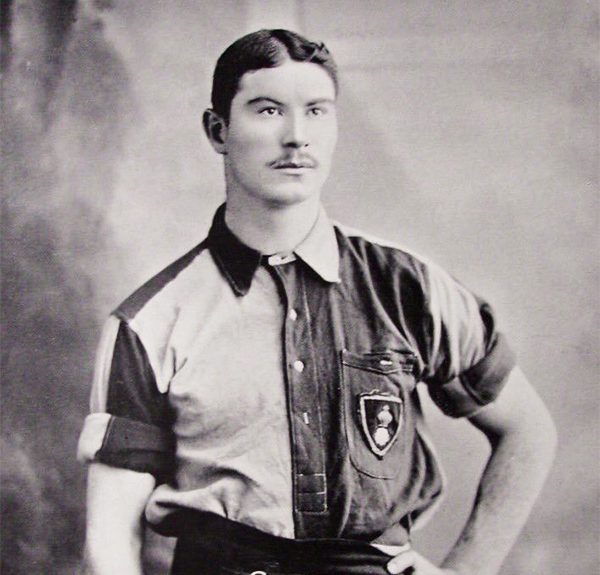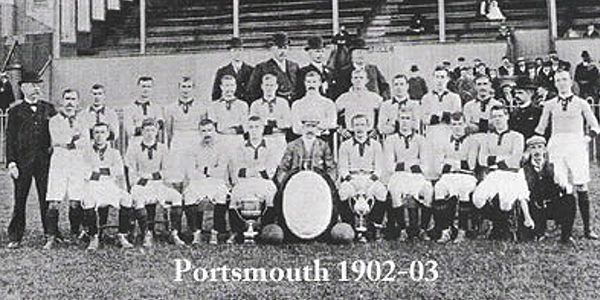
Pictured: Matthew ‘Gunner’ Reilly ready for battle.
Over a century ago, Matthew Reilly from Donnybrook became one of the first Dubliners to make a successful career as a footballer in England.
He played international football for Ireland and kept goal for some of the most famous clubs in the English game, wearing the jersey for Tottenham Hotspur and Notts County among others.
Matt was born in 1874 and at the age of eighteen he joined the British Army. He was first posted to Glasgow, where he tried football for the first time and right away he showed a natural talent in goal. He joined a local junior club, Benburb FC of Govan, and played so well that observers could hardly believe it when told he was new to the game.
In 1893, after a year in Scotland, Reilly was based in the Portsmouth area of England and playing for the Royal Artillery Football Club. He helped them reach two Army Cup finals at a time when that competition was particularly fierce. ‘Artillery’ also reached the final of the 1896 FA Amateur Cup, which they lost to Bishop Auckland. Despite being on the losing side that day, Reilly was acclaimed as the best player on the field, for his exceptional performance in keeping his team in the game. A press report of the time described him simply as “brilliant”.
Reilly had become very important to the Royal Artillery team by the time they won the Southern League Second Division in 1898. Next year, the club folded but there was no doubt that Reilly was destined to continue in the game and, after leaving the army, he signed for Portsmouth FC in July 1899. He played some of his best football during his five years with Portsmouth, and is still considered a club legend.
He had no real weaknesses as a ‘keeper. He was quick and sure in his handling and kicking, and showed great bravery in diving at the feet of advancing strikers to gather the ball. He had an instinct for sensing danger and was an expert at dealing with high balls into his area. This was despite the fact he was quite short for a goalkeeper at just 5’11”.
He put in some domineering displays in goal during his first season with Portsmouth, and quickly received the call to play for his country. On St Patrick’s Day 1900, Reilly won his first cap for Ireland, in the match against England at Lansdowne Road. It was the first time Ireland had played a home game in Dublin. Ireland had never won against England, and the previous match between them finished 13-2 to England.
The Freeman’s Journal took particular note of Matt, referring to “Matthew Reilly, the matchless Portsmouth goalkeeper.”
Despite a superb performance in the game, he couldn’t prevent Ireland losing again, but the 0-2 scoreline was a definite improvement on the drubbing of the last meeting between the teams.
When Reilly next played for Ireland, again versus England, it was an even tighter game. He conceded only one goal. In both of his international appearances, he had clearly aided in improving Ireland’s defensive displays.
Despite his impressive performances for Ireland, Reilly’s international career was stymied by the conventions of the era in which he played. Those early years of Irish international football were not at all favourable to players from outside Ulster. Actually there was a quite open bias towards players from the North. The fact that Reilly was picked at all, ahead of an Ulsterman, was a testament to how special a goalkeeper he was. Nevertheless, when Ireland’s next international came along in 1903, the number one jersey went to Billy Scott, of Belfast club Linfield FC.

Pictured: The Portsmouth team lineup shortly before he left.
Reilly was by then coming to the end of his long career with Portsmouth and, in 1904, he left the club and started a period as a wandering ‘goalie for hire’. He spent the 1904/05 season in Scotland with Dundee, then moved to the world’s oldest football league club, Notts County, for the ‘05/’06 season.
In October 1906, Tottenham Hotspur paid County a transfer fee of £100 for Reilly. It was no small price for a player back then, but he was considered well worth it for Spurs, one of the richest and most powerful clubs outside the Football League.
After just one season in North London, Reilly decided to leave Tottenham and move back to his native city, joining Shelbourne for the 1907/08 season. It was a good one for the Reds, and, with Reilly in goal, they reached the final of the Irish Cup in 1908. It was a significant achievement just getting to the final, as the Irish Cup was still an all-Ireland competition. It was the toughest knockout cup there has ever been in Irish football, and the big Belfast clubs held a virtual monopoly on the final.
Reilly could be proud of his year with Shelbourne and when the season was over, he retired from the game, moved back to Portsmouth and worked contentedly as a publican.
Although he was an Irishman, he found a real home on the south coast of England, and there he stayed. When Portsmouth FC celebrated its 50th year in 1948, Matt Reilly didn’t have far to travel when he was invited to the anniversary celebrations.
Nicknamed ‘Gunner’ Reilly, he was known to be a bit of a fiery character and his quick temper sometimes got him into trouble with the football authorities. One such occasion was during a match against Swindon for Portsmouth when he was hit by a stone thrown from the crowd. He promptly left his goal, went looking for the perpetrator and then proceeded to punch one unlucky spectator! It is not reported whether or not Reilly hit the right man, but it made no difference to his punishment and he was suspended for a grand total of two weeks.
The file photograph of Matt Reilly certainly appears to tally with the description of his intense character. The picture depicts him with his red hair cropped short as he looks somewhat fiercely into the middle distance. The picture could just as well be of some outlaw from the American West as an ex-Army footballer from Dublin. Either way, he certainly looks like a man you don’t want to mess with, someone you don’t want to be throwing stones at. Whether you’re a Sheriff or a striker, you’d be better off not getting into a shootout with Matt Reilly!
By Gavan Bergin



